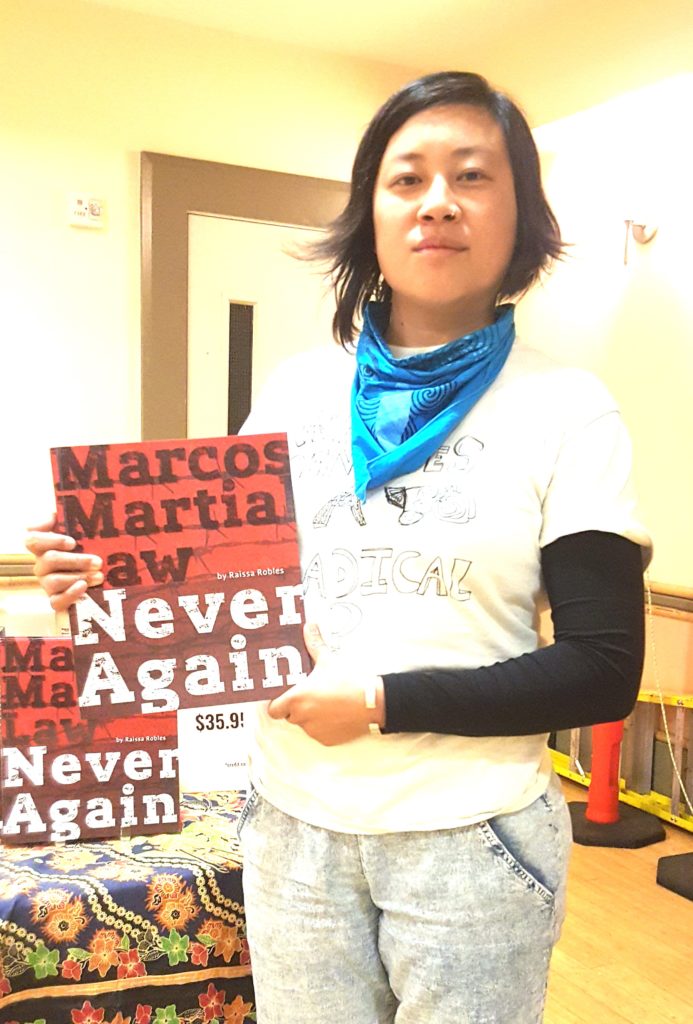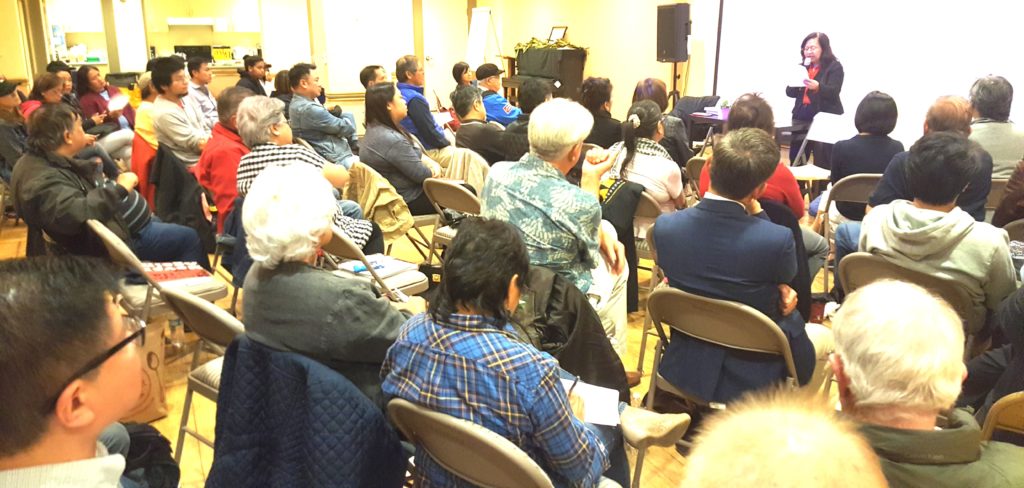Visiting journalist warns of PH dictatorship in the making
SAN FRANCISCO — A visiting investigative journalist and author of a bestselling book about martial law believes that the Philippines is headed toward another dictatorship, but only if the people will allow incumbent President Rodrigo Duterte to get away with his authoritarian ways.
Raissa Robles, author of the best-selling book Marcos Martial Law: Never Again about torture and atrocities under the dictatorship of President Ferdinand Marcos, recalled that Duterte friend and Agriculture Secretary Emmanuel Piñol wrote in his Facebook entry as early as 2015 that then would-be candidate Duterte would “only agree to become the president if people will allow him to declare Martial Law to address the slow wheels of justice in the country.”
Robles was guest speaker at a forum “Is the Philippines Heading Toward Another Dictatorship” October 12 in room packed with intent listeners, including local journalists.
Messianic leadership
Days before, Robles also spoke at the Filipino American International Book Festival at the San Francisco Main Library and at the University of California in Berkeley Graduate School of Journalism in a forum entitled, “Living Dangerously: Investigative Reporting from Marcos to Duterte” and the University of San Francisco (“The Filipinos’ Search for Messianic Leadership.”)

Author Raissa Robles (seated, left) signs the book of former fellow journalist now San Ramon, California-based Marian Cathedral-King (right) before her talk. INQUIRER/Jun Nucum
“Before the 2016 elections, probably December 2015, Duterte was already making broad hints that he would establish a dictatorship should he become the president, a one-man rule where the leader dictates everything to the civilian population. So even now he’s already dictating everything, from when there would be no classes in school, even to burying Marcos in the heroes’ cemetery,” Robles cited. She was quick to add though that Duterte still lacked the ability to change the Philippine Constitution at will.
Revolutionary government
Robles reported that at a graduation speech at Lyceum University during the presidential campaign, Duterte said that he intended to put up a revolutionary government instead of declaring martial which would require him to report to Congress.

Millenial Celi Tamayo-Lee said she recognized the similarities between U.S. President Donald Trump and Philippine President Rodrigo Duterte after the Raissa Robles talk, mainly their dictatorial style and impulsiveness. INQUIRER/Jun Nucum
“So he doesn’t even need to declare martial law, he just needs to declare a revolutionary government. He also said in a speech on August 29 this year that the revolutionary government was the way for the Philippines to progress. (‘For the Philippines to really go up, what is needed is not martial law. Go for what Cory did, revolutionary government.’ Then Duterte distanced himself from his own recommendation–’But don’t look at me. I can’t do it.’”
Robles clarified that while Corazon Aquino had a revolutionary government she did not use the powers available to her, for example, to prosecute Marcos cronies or prohibit the Marcos family from participating in politics. By all indications, however, Duterte would use all the extraordinary powers available under the set-up. Robles said that Duterte made a telling statement that in order to reform the government bureaucracy, all positions in government should be declared vacant.
Following Marcos’ game plan?
Duterte also appears to be following Marcos’ game plan, said Robles, enumerating similarities between Duterte and Marcos’s moves as a prelude to imposing a dictatorship.
“Duterte startled me when like Marcos he said that he would increase police and military pay, he would execute drug traffickers (just like Marcos who executed Chinese national Lim Seng for drug trafficking after imposing martial law). Duterte even threatened to padlock Congress just like what Marcos did in 1972 if the lawmakers oppose his fight against crime. Duterte has a supermajority in Congress that is beholden to him.
“I found out that one of the things that Marcos deeply resented just before imposing martial law were opinion and editorial columns accusing him of stashing his wealth abroad.” Duterte is also visibly angered by similar accusations.
Duterte seems to be taking steps to control the Supreme Court by trying to impeach Chief Justice Lourdes Sereno, said Robles. “He is also undermining freedom of expression by vilifying mainstream media by abetting social media trolls and exaggerating the drug and communist threats as potential excuses for harsher measures.” Some of his officials are now also beginning to publicly equate dissent and criticism of the administration as acts of destabilization by “enemies of the state.”
Coup or withdrawal of support
Asked if a military coup against Duterte was possible, Robles explained that the military can have two ways of expressing their displeasure towards the President: a military coup that would directly oust him; or withdrawal of support, which could lead to resignation.
“I received reports that some police officers are seriously thinking of withdrawing their support because the morale in the police has really fallen. Besides, although Senator Antonio Trillanes may say that he already left behind his coup days, but part of his core group is still intact,” Robles warns.
“My sources told me that if Duterte imposes martial law in the whole country the military would go along with it if there is enough reason for it. But if they feel that there is not enough reason for a nationwide martial law, they might not go along, which could lead to a withdrawal of support,” Robles added.
Robles also bared that a general told her he feared not a coup but an assassination by certain members of the military that are not comfortable with how close Duterte was to the left, “and that maybe the reason why Duterte was forced to remove leftist members of his cabinet.
It is also noteworthy, Robles said, that Defense Secretary Delfin Lorenzana in his testimony before Congress on the Marawi fighting said there would be no martial law nationwide under his watch. “Of course, if Lorenzana is removed from office, that is another story.”
Achilles heels
“Duterte also has three Achilles heels,” said Robles. “First is his health as we don’t know how healthy he is. Second — women for no one knows what compromising situation he might get himself in. Third, he has very poor impulse control–saying something then backtracking. Past Presidents Fidel Ramos and Ferdinand Marcos were not like that,” stressed Robles.
.
Robles asked that Fil-Ams to help prevent another dictatorship by fighting the online battle, to open their eyes and ears to things that they can expose to the public, like high Philippine officials who have high-priced properties in the Bay Area, and to pressure their own congressmen and senators not to support Duterte’s drug war.

Donnie De Leon of the Filipino American Human Rights Alliance explains the lobbying for Senate Bill 1055 which would restrict arms sales to the Philippine National Police and give aid for drug rehabilitation and humanitarian programs. INQUIRER/Jun Nucum
“There are controversies that are happening in both the U.S. and Philippine settings. I was trying to make those comparisons,” said millennial Celi Tamayo-Lee.
US Senate Bill 1055
Ago Pedalizo and Donny de Leon the Filipino American of Human Rights Alliance (FAHRA) reported Senators Marco Rubio (R-Florida) and Ben Cardin (D-Maryland) have co-introduced SB 1055 or the “Philippine Human Rights Accountability and Counter-Narcotics Act” which, among other things, restricts arms sales to the Philippine National Police and provides $25 million in aid for human rights, democracy, drug rehabilitation and public health promotion.”
The group also circulated a petition directed to the US Congress to stop extrajudicial killings in the Philippines.
These events have been sponsored by various groups, including the Philippine American Writers and Artists (PAWA), Friends of Akbayan, Former members of the Katipunan ng mga Demokratikong Pilipino, Filipino Advocates for Justice (FAJ), and the Filipino-American Human Rights Alliance (FAHRA).
Robles also spoke in Los Angeles and will be speaking in New York, Washington DC and Seattle.


